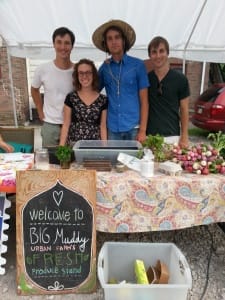by Elizabeth Wolf
 |
Omaha, Nebraska |
Say “farm” and, despite the spread of industrial-scale agriculture, images of red barns, lone farmhouses and acres of crops growing in the country come to mind. Yet as the world becomes increasingly urbanized (over 80% of Americans live in cities), so too has food production. In fact, the USDA estimates that 15% of the world’s food supply is now grown in urban centers.
Whether via community gardens, vacant lots, backyards, front yards, municipal orchards, patio containers, rooftop gardens, window boxes, indoor systems or other means, urban agriculture is a growing trend—or, more accurately, a returning practice. Long before WWII victory gardens grew 40% of all vegetables in the U.S., from ancient times cities have produced at least some food within their borders.
Big Muddy Urban Farm is reviving this tradition in Omaha, Nebraska. Founded in the winter of 2011 by a group of friends, all in their 20s, the farm is now a collective of seven producers, aided by volunteers from the ’hood and local schools. The growers raise fruit, vegetables, herbs and chickens at five sites within a three-mile radius. Long an area blighted by abandoned buildings, drug use, and crime, the Gifford Park neighborhood is now turning around. “The neighbors love the gardens,” says Brent Lubbert, one of the founders and now the farm manager. “They love to see the plants grow and stop to watch the chickens.”
Big Muddy, the nickname of the nearby Missouri River, offers a distinct alternative to “Big Money.” Grassroots from the get-go, the farm’s start-up funds came from CSA shares sold before the first seeds were sown. The landowners, growers themselves, gave the use of the vacant lots rent-free if the farmers promised to grow food and sell it at the neighborhood farmers market. Four seasons later, they do so each Friday evening spring through fall, equipped with a retrofitted industrial fridge on wheels they use as a cooler.
The CSA is still going strong, with about 30 members. Surplus is sold to local restaurants. Big Muddy also offers “community shares” that benefit Table Grace, a pay-what-you-can café that turns no one away.
Big Muddy grows without pesticides or synthetic chemicals and works to improve the soil. On their first plot, raised beds above the lead-contaminated earth grow greens and minimize stoop labor. At the historic Joslyn Castle, the growers are cultivating the land originally used for the mansion’s kitchen garden. Big Muddy also has a plot in a community garden, a seed-to-table demo project for kids. Last year’s “pizza garden” was a big hit. This year’s crop of cabbage will fuel later workshops on fermented foods. On the fifth site, a house burned down and the ground needs work. “I’d rather know how to bring soil back to life rather than just be given good soil,” says Brent. “It’s a good skill to have.”
Big Muddy is also renovating a large old home in the neighborhood. Their “farmhouse in the city” will house apprentices and deepen the collective’s bonds.
For the growers, urban farming is as much about education as it is about food. Deeply concerned about the state of the food system, the collective wants to foster community resilience, empowerment, and a more localized economy.
“We need more farmers in our society,” says Brent, citing the legions of producers approaching retirement and too few young people to fill their shoes. “If you keep food production on the outskirts, it’s out of sight, out of mind. But when people see food being grown, they understand it’s a viable thing to do in a city.”
To share that message, Brent and his friend and fellow Omahan Dan Susman made the award-winning documentary Growing Cities showcasing dozens of urban ag initiatives across the country. Crowdfunded through Kickstarter, the film has shown on over 80 PBS channels so far.
The message of both Big Muddy and the film is one of hope and action. Says Brent, “In this period of doom and gloom environmentally, there are projects out there that are turning that doom around. You can do that, too.”
BIG MUDDY URBAN FARM
www.bigmuddyurbanfarm.weebly.com
[email protected]

